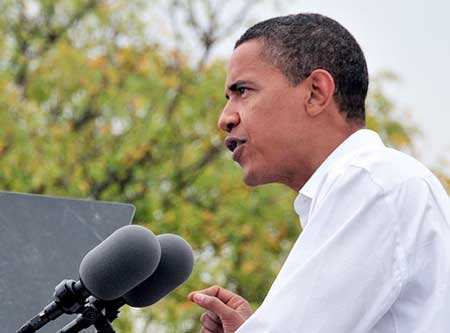Stakes High For Obama's State Of The Union

Obama must outline specifics to his agenda in order to rally supporters
back to the Democrats. (Creative Commons)
When President Obama jaunts down the aisle of the House of Representatives for his first State of the Union address, he will do so with a nation looking for direction and a certifiable plan from its leader.
A lot is at stake for Obama in his address, as his speech will likely address everything from the crisis in Haiti, to the economy, healthcare, and Don't Ask Don't Tell. For most Americans, concern is greatly focused on jobs and the economy.
The poll also reflected the importance Americans have placed on Obama's speech, with some ranking it higher than the past several State of the Union addresses given by former President George W. Bush.
"39% say that this year's address will be more important than past
years' addresses, while 45% think it will be about as important as
previous State of the Union addresses. Just 9% say it will be
less important. At 39%, the public assigns greater importance to
Obama's address than they did to the last three State of the Union
speeches given by former President George W. Bush. Nonetheless, fewer
see Obama's upcoming address as more important than said that about
Bush's State of the Union addresses in 2002 and 2003."
The address is more than just an important speech for Obama, who some believe all too often feels comfortable making speeches, but doesn't follow through on promises.
Conservative news blog Main Street Radical wonders, "Can Obama change?... Or will he stick with the same agenda
and address the misguided opposition in a deluge of 'let me be clear' statements that are anything but clear? Can he put forth a
comprehensive plan to fix the economy? Will he suddenly decide that it
is okay to be tough on terrorism?"
The president risks not only being too soft on issues but also painting with broad strokes instead of poignant specifics. Obama outlined Monday the important issues he would address, focusing on middle-class Americans. But some critics scoff at what they define as a scaled back version of what the president promised a year ago. Yet Vice President Biden rejected that notion. "They're bid-deal things if you're just able to give some respite for a husband and wife, both working, to give a little bit of help," he said.
After Democrats lost their filibuster-proof majority in the Senate last week, Republicans have been surging toward the 2010 midterm elections. Now Obama must restore some of the faith and energy the Democrats felt a year ago, which could help raise his popularity rating that has fallen in the past year. Although, the president told ABC News' Diane Sawyer, "I'd rather be a
really good one-term president than a mediocre two-term president." Whether Obama is concerned about his popularity or not, fivethirtyeight.com, laid out exactly why the president shouldn't be worried just yet in the election process--though it points out that "for every point change in presidential approval, a party can expect to lose another 1.4 House seats or so."
Keeping enough of his supporters happy and committed to the Democrats' agenda could be difficult as there are many special interests who have been frustrated with the lack of movement by the administration. For instance, questions still linger over the closing of Guantanamo Bay. Environment advocates are wondering if the President will even address climate control and going green in his speech. And the LGBT supporters are so feed up with the president's non-committal attitude toward repealing Don't Ask Don't Tell, some hope he doesn't even mention it in his address for fear it will be more watered down rhetoric.
Even with all these questions still up in the air, Slate's Eliot Spitzer still wants the president to remember "Don't waste the crisis" and utilize the recent struggles to push forward his broad-based agenda. Spitzer suggests six strategies for Obama's administration.
Regardless of what he addresses, the president must make sure he not only brings his best and most energetic speech to the House, but that he is able to bolster his speech with tangible actions within the next year.



